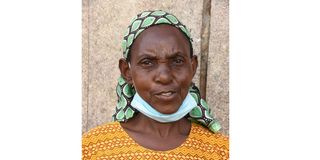Premium
Rising cancer cases puzzle specialists

Community Health Volunteers follow proceedings during the launch of the National Cervical Cancer Awareness Week in Nanyuki town on January 19, 2021.
What you need to know:
- Cancer of the oesophagus, colorectal and lymphoma are the most prevalent, even though researchers are yet to figure out why certain types are more prevalent in particular regions of the country.
Cancer cases are on the rise, puzzling specialists.
Cancer of the oesophagus, colorectal and lymphoma are the most prevalent, even though researchers are yet to figure out why certain types are more prevalent in particular regions of the country.
Kenyatta University Teaching, Referral and Research Hospital chief scientific adviser George Njoroge says oesophageal cancer is the most lethal.
“The incidence rate for oesophagus cancer is 18.4, which is similar to the mortality rate. This means almost all patients diagnosed with this type of cancer die,” Prof Njoroge said.
Some 2,974 Kenyans have been diagnosed with cancer of the oesophagus, accounting for 7.1 per cent of the 42,116 new cases reported.
Cancer of the oesophagus, which afflicts men and women, is the fourth-worst type. Late diagnosis is the main cause of death.
Dr Geoffrey Mutuma, a consultant pathologist and chief executive officer at Zambezi Cancer Centre in South C, Nairobi, says lack of sound policies and research are to blame for the situation.
“My 2003 oesophageal cancer research revealed that places where tea and coffee are grown are the most affected by of cancer. I do not know why,” said the pathologist.

Brian Mberia, a 25-year-old from Nanyuki, who was diagnosed with non-Hodgkin lymphoma when he was 14 years old.
Brian Mberia, 25, non-Hodgkin’s lymphoma.
Brian Mberia, a Nanyuki resident who teaches German to Grade Four learners, was diagnosed with non-Hodgkin’s lymphoma. This type of lymphoma is common, does not spread and starts in the skin. It is also called skin lymphoma or cutaneous lymphoma.
Mberia was diagnosed with the disease at 14, a few days after joining Meru School.
“My mother had just died from the same disease. It started as a small painless growth in the neck,’’ he said.
Moi Teaching and Referral Hospital chief paediatric oncologist Festus Njuguna says more than 3,000 children in Kenya get cancer every year, with the majority occurring in youngsters aged zero to five years.
Another cancer that commonly affects children, according to the oncologist, is retinoblastoma, which begins in the retina (the lining inside the eye).

Margaret Wanjiru, a cancer survivor from Nyeri County.
Ms Margaret Wanjiru, 20, Lymphoma
At just 18, Margaret Wanjiru was bubbling with life – the kind of life that shuttles between school and partying. For a person that age, confidence matters. She was just about to join college.
In December 2018, cancer creeped in. It started as a sore throat.
“I remember having tonsils, which made my neck swell. I thought it was just an ordinary infection. That was in July,” she says.
Five months later, the growth got worse, prompting her to seek treatment. By the time Wanjiru arrived at Consolata Hospital, her whole neck was swollen. Doctors recommended an X-ray, thinking she had TB. She had a minor surgery in December. In January 2019, tests showed she had lymphoma stage 2. Lymphoma is a cancer of the body’s disease-fighting network. The main types are Hodgkin’s lymphoma and non-Hodgkin’s lymphoma. Symptoms include enlarged lymph nodes, fatigue and weight loss.

Cancer patient Gladys Makokha, who is from Kakamega County.
Gladys Makokha, 62, Colorectal cancer
In Musanda village, Kakamega, Gladys Makokha, 62, struggled to sit straight in order to speak to the ‘Nation’. She is a mother of four, though two have died. From early 2018, her life was plagued by endless stomach upsets.
“I vomited frequently. Back pains set in and it became impossible to relieve myself,’’ she said.
“She has had two operations after being diagnosed with colorectal cancer. Colorectal, bowel, colon, or rectal cancer refers to any cancer that affects the colon and the rectum.
It begins when healthy cells in the colon mutate. Factors that may increase the risk of getting the disease include old age, inflammatory intestinal conditions and genetic.
It is the third leading cause of deaths in the country and second among non-communicable diseases, accounting for seven per cent of the overall mortality rate, experts say.

Leonida Imeli from Buyonga village in Kakamega East during an interview on February 2, 2021.
Leonida Imeli, 57, Oesophageal cancer
In October 2020, Leonida Imeli, who hails from Mukulusu village in Kakamega County, found it difficult to eat or swallow. The pain in her throat had become unbearable. She cried at the thought of drinking water.
“I thought it was a cold and took some tablets,” the mother of four said.
Dr Dismus Elikana of Kakamega County Referral Hospital says many of those who seek treatment alrady have stage three or four of the disease.
“Patients present themselves late due to the nature of the symptoms. Early screening is important. It is also important to avoid common risk factors like smoking and alcohol,’’ he said.
Diagnosis is still a major problem in Kakamega due to unavailability and inadequacy of equipment and specialists. The National Hospital Insurance Fund, Dr Elikana adds, is the only way out for most patients in the region.






